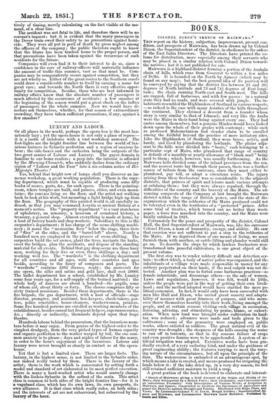LUXURY AND LABOUR.
OF all places in the world, perhaps the opera-box is the most lux- uriously lazy ; yet the opera-house is not only a place of repose— it is a castle of indolence with a vast workshop annexed. The foot-lights are the bright frontier line between the world of lux- urious laziness in Sybarite perfection and a region of anxious la- born.; the side-boxes and the orchestra being the outposts of the two great armies of Labour and Luxury. The gayer domain is familiar to our home readers ; a peep into the interior is afforded by the Morning Chronicle, who suddenly dashes from the ordinary region of "Labour and the Poor" into a six-column notice of Her _Majesty's Theatre !
Yes, behind that bright row of lamps shall you discover an im- mense workshop, a great working population. There is the copy- ing department, which must be capable of producing some fifty books of scores, parts, &c., for each opera. There is the painting- room, where temples are built, and palaces, cities, and even mountains; the canvass lying on the floor, and the artist not walking back to look at his work, but mounting a light bridge high up from the floor. The geography of this painted world is all carefully in- dexed, so that you may command Assyria or ancient Britain at a moment's notice. The "property department" is a vast storehouse of upholstery, an armoury., a museum of unnatural history, a treasury, a general shop. Almost everything is made at home, by a host of factory hands and shop workers. Subsidiary to this is the carpenter's department; it has charge of the scene-shifting machi- nery; it mans the "mezzanine floor" below the stage, three tiers of " flies " at the sides, and the "barrel-loft" above. Nearly a hundred men are employed in the process of scene-shifting. The carpenters build the set scenes, plant the trees, navigate the barks, erect the bridges, plan the accidents, and dispose of the standing material for all events. Behind that gay drop-scene are those busy men, working for their five or even three shillings a day ; and working well too. The " wardrobe " is the clothing department for all countries and all ages, with other countries and ages beside, according to the fancy of composers and poets. The " wardrobe " contains 5382 dresses, ready ; the materials for one opera, the silks and satins and gold lace, shall cost 2000/. The ballet department has a school, established by Mr. Lumley some four years ago, for a self-supply of the trained materiel : the whole body of dancers are about a hundred—the pupils some of whom aid, about thirty or forty. The chorus comprises fifty or sixty trained musicians. Besides these departments, there is the fire brigade, the gas department, with a host of officials—stage director, prompter, and assistant, box-keepers, check-takers, por- ters, police constables, house-cleaners, washerwomen, printers. Some five hundred persons are enrolled as working members of the establishment, besides casual but frequent helpers, supernumeraries, &c. ; directly or indirectly, thousands depend upon that huge theatre.
Hundreds labour behind the proscenium, that the luxurious num- bers before it may enjoy. From genius of the highest order to the simplest drudgery, from the very picked types of human capacity and organic perfection to the worker warped by toil, the one com- mon anxiety is to please : days and nights of labour for the many, in order to the hour's enjoyment of the luxurious. Labour and luxury were never brought so closely in contact as at the opera. house.
Yet that is but a limited view. There are larger facts. The luxury, in the highest sense, is not limited to the Sybarite order, nor indeed really tasted by them. There is the luxury of the artist; there is the work which is consecrated by setting forth a model and standard of art elaborated to its most perfect execution. There is many a hard-worked artist who would scarcely change with the listless Sybarite in the softest of the seats. This artist class is common to both sides of the bright frontier line—for it is vagaband class, which has its own laws its own passports, its own alliances. It is that class which really rules, on both sides ; and the interests of art are not subservient, but subserved by the luxury of the hour.


























 Previous page
Previous page